It’s time. It’s time for me to write again. And it’s time for the world to learn about Portpatrick. Sounds a bit dramatic? It is! Dramatically beautiful…
Page Contents (click line to jump the text)
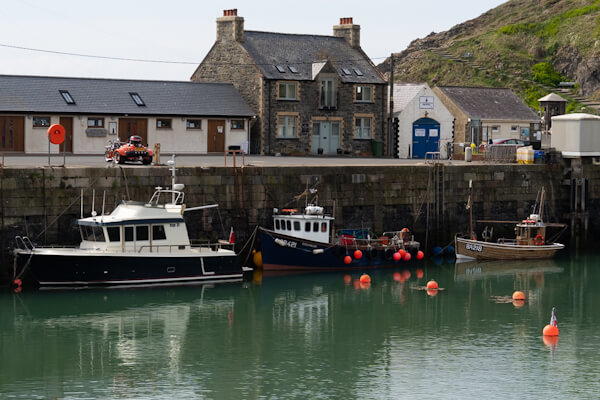
Intro and travel report
We were back in Scotland again. This time with the motorhome. With mostly beautiful and gorgeous weather, I took around 1,800 photos in the three weeks from the end of May to mid-June – no joke. I spent ages sorting through them and editing them a little, and now I want to write again. About Scotland, one of my favourite countries.
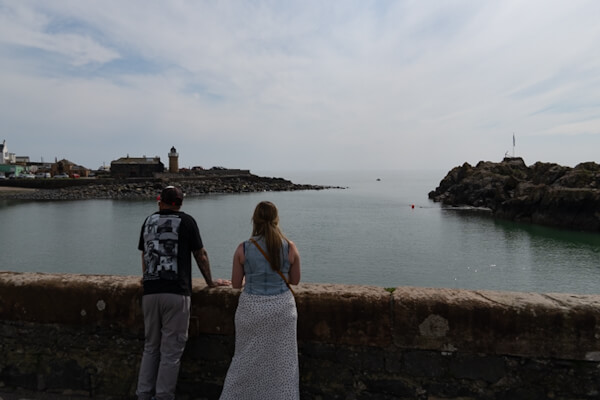
But where to start? Chronologically, or by focusing on one area first? Or just somewhere? Chronologically is completely out of the question, because we visited Portpatrick on our last day in Scotland. One day later, we took the ferry from Cairnryan back to Ireland via Northern Ireland.
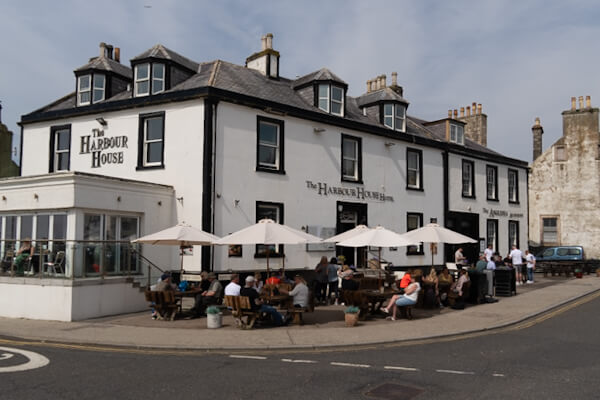
‘Focus’ and ‘somewhere’ are more accurate descriptions, because both my wife and I found Portpatrick and the Mull of Galloway to be a truly wonderful day trip and the perfect end to our tour. I will link my article on the Mull of Galloway and the lighthouse at the bottom of this page.
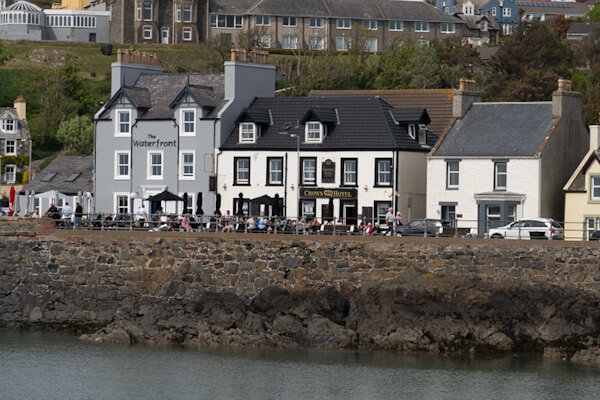
But let’s start with Portpatrick: this small harbour town is beautifully situated on the south-west coast of Scotland. The Mull of Galloway, a little further on, is actually the southernmost point of Scotland. Here, Northern Ireland and southern Scotland are only about 35 kilometres apart and are connected by excellent ferry services.
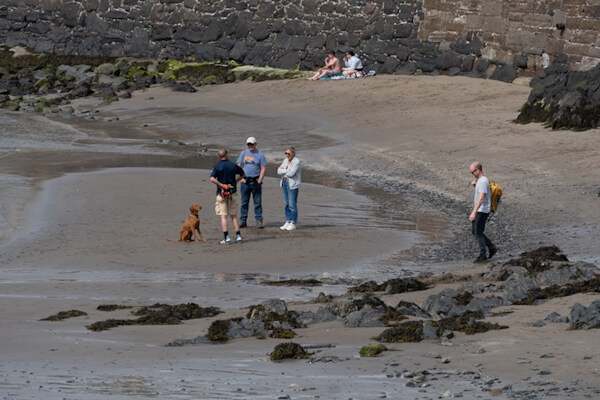
Portpatrick is definitely a very picturesque and charming little harbour town in Scotland. There are quite a few visitors at the weekend, but it’s not too busy, as most of them seem to be locals – we didn’t hear any languages other than English spoken in Portpatrick.
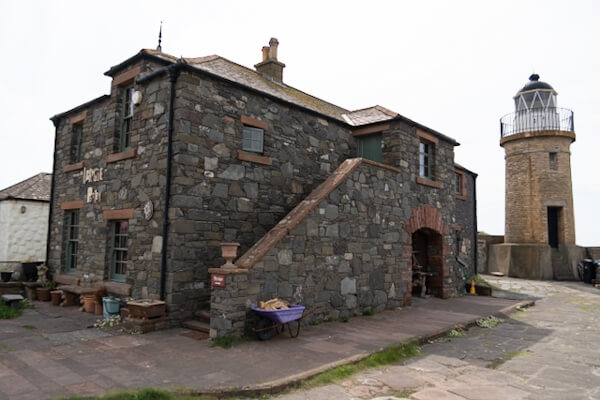
Perhaps this is because the town is not promoted as a tourist destination, or only to a limited extent, because the small road leading there is not suitable for bus tours, or because the entire region is far away from the tourist mainstream anyway. Who knows?
Whatever the reason, it is just right! In any case, we spent a few pleasant hours there and thoroughly enjoyed the wonderful weather.
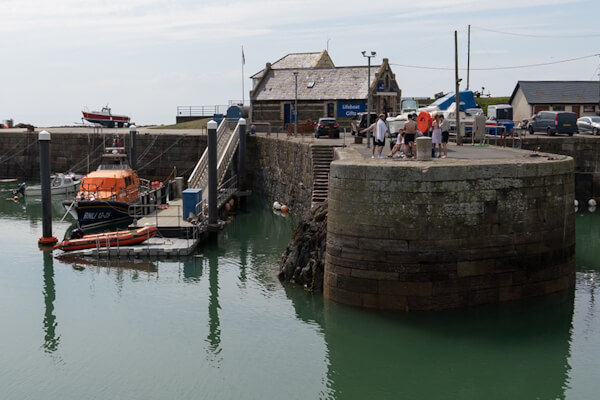
A few boats bob up and down in the small harbour, protected by a high, long pier. This pier and the small lighthouse reveal that the harbour was once quite important – certainly for fishing, and probably for maritime trade as well. The high pier and a few offshore rocks and cliffs provide good protection for the crescent-shaped harbour bay.
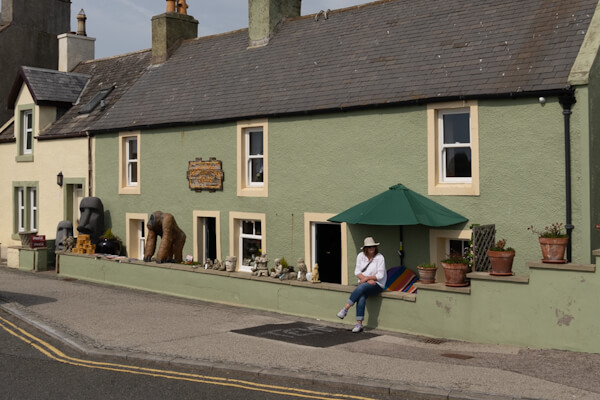
It’s low tide – a few families are enjoying themselves on the small beach and people are having lunch on the terraces of the waterfront, some even with live music.
In front of the ice cream stand, a cute old-timer chugs up, driven by another old-timer. A few men stroll over and ask the man about his beautiful car. The bonnet is opened and the little engine is admired at length.
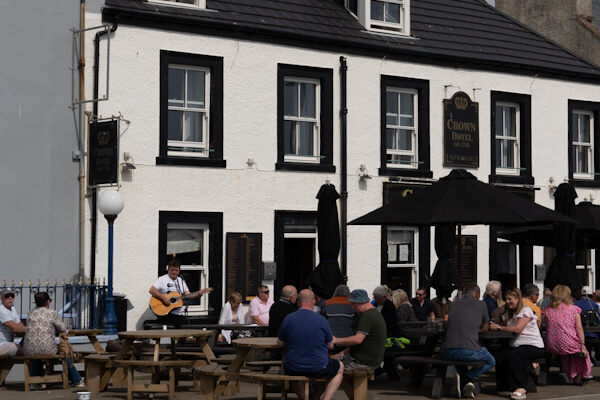
A group of young people are standing together on the pier. Every now and then, one of them jumps down into the harbour basin, accompanied by the cheers of the others. How high is it, 4 metres? I don’t know, but it’s quite high!
After enjoying a delicious ice cream and taking in many beautiful sights, we get back into our motorhome and chug the short distance to Stranraer to our campsite.
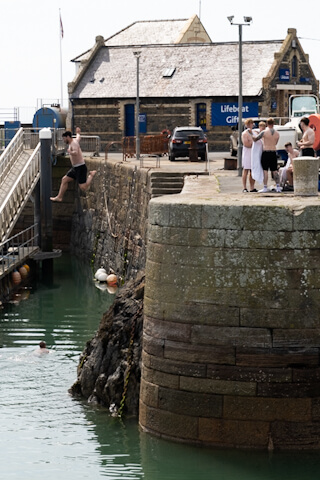
Brief background to Portpatrick
Portpatrick is a good 700 years old and was built near the even older Dunskey Castle. Its origins lie in fishing, which was traditionally practised in the crescent-shaped bay.
Later, a proper harbour with a south pier and a north pier was built. The north pier no longer exists, but the south pier is still standing. In the 17th century, Portpatrick was an important seaport for shipping traffic to Northern Ireland (then still Ireland).
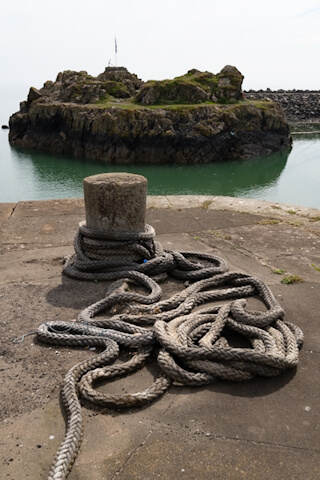
Southern Scotland and Northern Ireland are closely linked, namely by the 35 km Celtic Sea and by common ancestors who crossed it back then.
When the English attempted to bring the chronically rebellious Irish under better control at the beginning of the 17th century, they came up with the Ulster Plantations: these enabled Protestant settlers loyal to the king to settle in Ulster, the north-eastern part of the island of Ireland, to own land there and to live there.
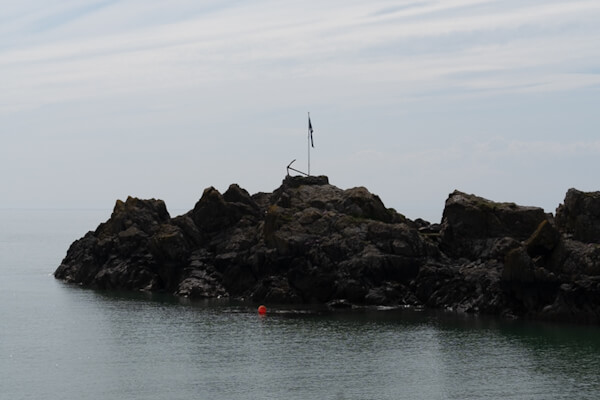
This was intended to counterbalance the less royalist and Catholic Irish population. It was so successful that the English unwittingly laid the foundation for today’s Northern Ireland, which was established some 200 years later. Many of today’s Protestant Northern Irish originally come from this region in southern Scotland, and certainly some from Portpatrick.
In later times, maritime traffic was relocated to the nearby Bay of Stranraer, from where (Cairnryan) ferries still operate to Northern Ireland today.
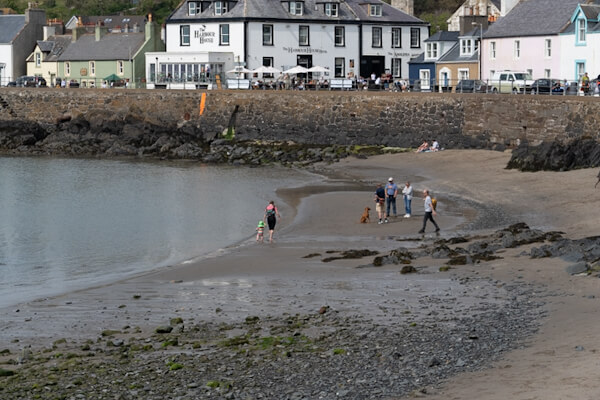
Portpatrick was probably named after Old Portpatrick Kirk, or St Patrick’s Church, formerly a chapel dating from the early 17th century. St Patrick is the most important patron saint of the Irish, and the church has an unusual shape for Scotland, as the tower is round.
Either it was originally a lighthouse, or (and this seems more plausible to me) the tower and the original church were built by the Irish, as round towers are more common there.
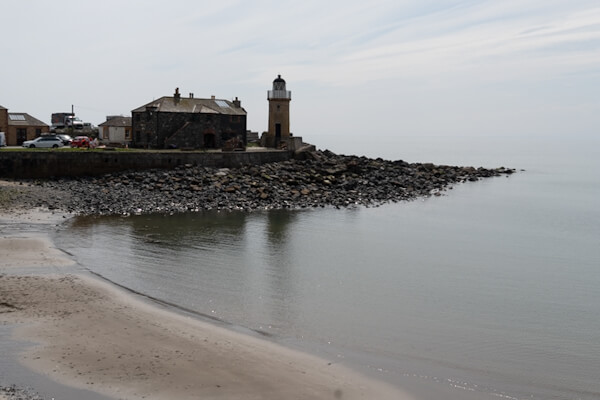
If you want to stay overnight in Portpatrick: The large hotel above the harbour is over 100 years old and therefore historic. There is also a small hotel in the harbour itself, where I stayed a few years ago, and there are other B&Bs and options that you can easily find on one of the major booking platforms.
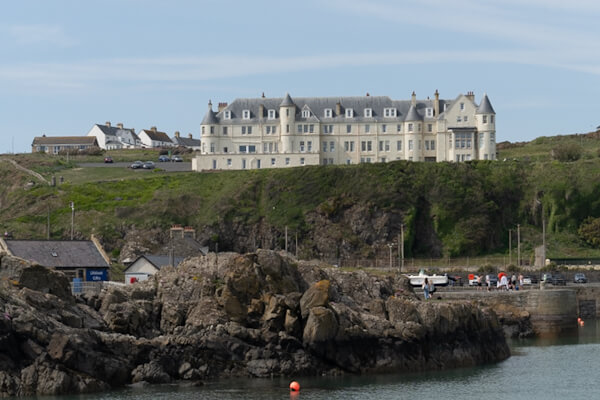
Conclusion
The Mull of Galloway is a beautiful peninsula with a stunning lighthouse at the southernmost point of Scotland. The small harbour town of Portpatrick is located on the west coast of the peninsula, and you can easily visit both in one day while taking a tour around the beautiful peninsula.
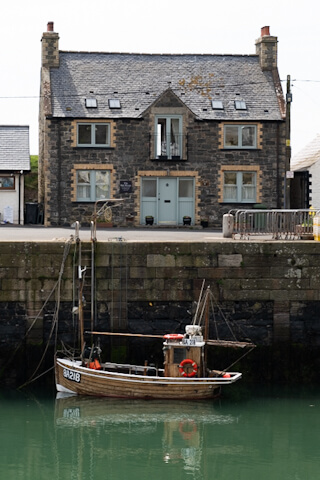
This is particularly useful if you are combining your trip to Scotland with a tour of Northern Ireland or Ireland. The ferry connections from Cairnryan to Belfast (Stenaline) and Larne (P&O Ferries) are excellent, and the crossing takes less than two hours.
We had a wonderful time in Portpatrick, and if you are in the area, I highly recommend a visit.
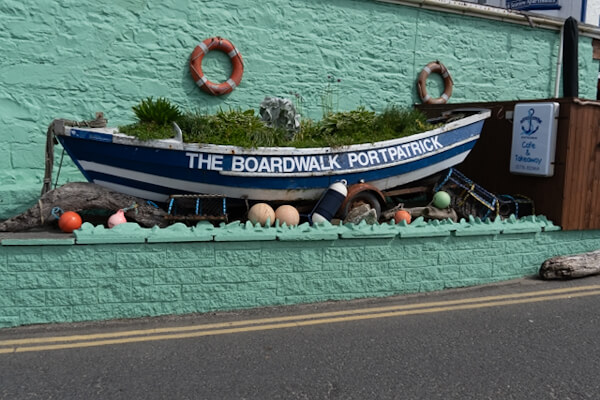
More interesting articles for you
BEAUTY ON THE ROCKS: AT THE SOUTHERNMOST POINT OF SCOTLAND
BEAUTY ON THE ROCKS: AT THE SOUTHERNMOST POINT OF SCOTLAND
THE ISLE OF SKYE
VIBRANT GLASGOW: WHAT TO SEE AND WHAT TO DO
Image credit cover photo: Portpatrick (photo: Ulrich Knüppel-Gertberg)